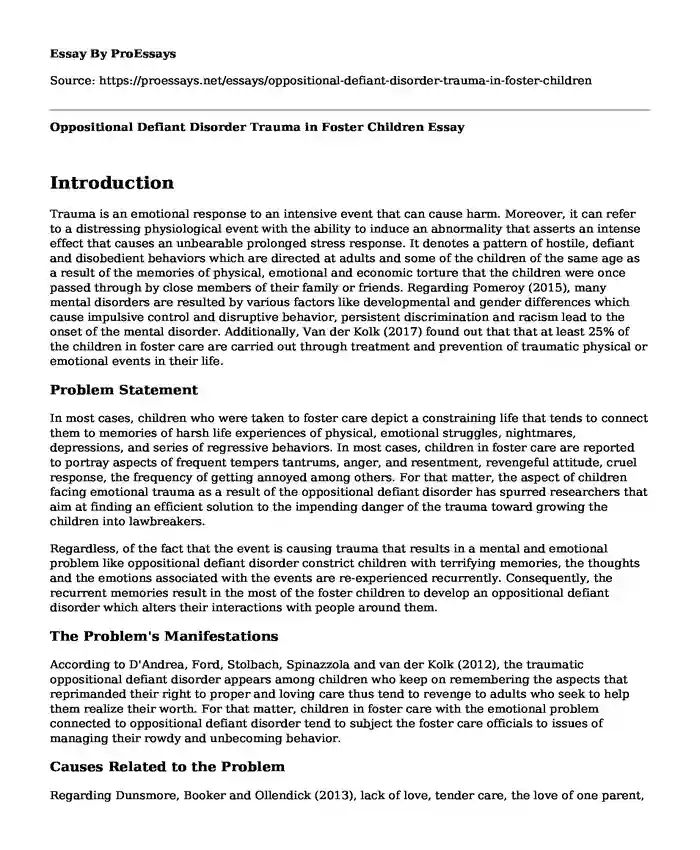Introduction
Trauma is an emotional response to an intensive event that can cause harm. Moreover, it can refer to a distressing physiological event with the ability to induce an abnormality that asserts an intense effect that causes an unbearable prolonged stress response. It denotes a pattern of hostile, defiant and disobedient behaviors which are directed at adults and some of the children of the same age as a result of the memories of physical, emotional and economic torture that the children were once passed through by close members of their family or friends. Regarding Pomeroy (2015), many mental disorders are resulted by various factors like developmental and gender differences which cause impulsive control and disruptive behavior, persistent discrimination and racism lead to the onset of the mental disorder. Additionally, Van der Kolk (2017) found out that that at least 25% of the children in foster care are carried out through treatment and prevention of traumatic physical or emotional events in their life.
Problem Statement
In most cases, children who were taken to foster care depict a constraining life that tends to connect them to memories of harsh life experiences of physical, emotional struggles, nightmares, depressions, and series of regressive behaviors. In most cases, children in foster care are reported to portray aspects of frequent tempers tantrums, anger, and resentment, revengeful attitude, cruel response, the frequency of getting annoyed among others. For that matter, the aspect of children facing emotional trauma as a result of the oppositional defiant disorder has spurred researchers that aim at finding an efficient solution to the impending danger of the trauma toward growing the children into lawbreakers.
Regardless, of the fact that the event is causing trauma that results in a mental and emotional problem like oppositional defiant disorder constrict children with terrifying memories, the thoughts and the emotions associated with the events are re-experienced recurrently. Consequently, the recurrent memories result in the most of the foster children to develop an oppositional defiant disorder which alters their interactions with people around them.
The Problem's Manifestations
According to D'Andrea, Ford, Stolbach, Spinazzola and van der Kolk (2012), the traumatic oppositional defiant disorder appears among children who keep on remembering the aspects that reprimanded their right to proper and loving care thus tend to revenge to adults who seek to help them realize their worth. For that matter, children in foster care with the emotional problem connected to oppositional defiant disorder tend to subject the foster care officials to issues of managing their rowdy and unbecoming behavior.
Causes Related to the Problem
Regarding Dunsmore, Booker and Ollendick (2013), lack of love, tender care, the love of one parent, developmental and gender differences, persistent discrimination and racism are the major factors that result into a traumatic disorder that result into oppositional defiant disorder among foster children. Additionally, lack of proper attention and divorce of parents are among the factors that lead to worse traumatic problems to children thus making them develop ODD.
Intervention Plan
Prevention is always the best approach to take. For that matter, parents should always avoid incidents that might make their young ones to develop anxiety and trauma regarding the way they disagree with their spouses. According to Cook et al. (2017), whenever situations tend to alarm about frequent disagreements from spouses, then the children should be spared the effect of traumatic responses by taking the initiative to make them foster care immediately before they take sides. For the case of the children who have already been affected by ODD, then they should be administered with DSM-IV tablets to save them from the severe antisocial behaviors that tend to make them defiant to all sorts of rules (Stepp, Burke, Hipwell & Loeber, 2012). Also, the condition tends to require both social support and mental sickness treatment.
Evidence-Based Practice Research Question
Since children with extreme traumatic problems and those with extreme ODD pose significant challenges to the foster care officials in trying to shape their mental issues, should they be taken to a better rehabilitation center or absorbed into foster care and be allowed to associate with their fellow children?
References
Cook, A., Spinazzola, J., Ford, J., Lanktree, C., Blaustein, M., Cloitre, M., ... & Mallah, K. (2017). Complex trauma in children and adolescents. Psychiatric annals, 35(5), 390-398.
Dunsmore, J. C., Booker, J. A., & Ollendick, T. H. (2013). Parental emotion coaching and child emotion regulation as protective factors for children with the oppositional defiant disorder. Social Development, 22(3), 444-466.
D'Andrea, W., Ford, J., Stolbach, B., Spinazzola, J., & van der Kolk, B. A. (2012). Understanding interpersonal trauma in children: Why we need a developmentally appropriate trauma diagnosis. American Journal of Orthopsychiatry, 82(2), 187-200.
Pomeroy, E. (2015). The clinical assessment workbook: Balancing strengths and differential diagnosis. Psychiatric Times.
Stepp, S. D., Burke, J. D., Hipwell, A. E., & Loeber, R. (2012). Trajectories of attention deficit hyperactivity disorder and oppositional defiant disorder symptoms as precursors of borderline personality disorder symptoms in adolescent girls. Journal of abnormal child psychology, 40(1), 7-20.
Van der Kolk, B. A. (2017). Developmental Trauma Disorder: Toward a rational diagnosis for children with complex trauma histories. Psychiatric annals, 35(5), 401-408.
Cite this page
Oppositional Defiant Disorder Trauma in Foster Children. (2022, Mar 29). Retrieved from https://proessays.net/essays/oppositional-defiant-disorder-trauma-in-foster-children
If you are the original author of this essay and no longer wish to have it published on the ProEssays website, please click below to request its removal:
- Background of Speech Delay in Toddlers - Research Paper Sample
- Alternate Observation in Authentic Learning
- Attending Workshops Essay
- Ontological Views on Loss and Grief Paper Example
- Essay Example on Play Reversed: Betrayal Unveiled in Decade-Long Relationship
- Essay Example on Gender Stereotypes Redefined in "The Incredibles1&2" Movie
- Gender Inequality: The Deep-Rooted Consolidating Principal - Essay Sample







